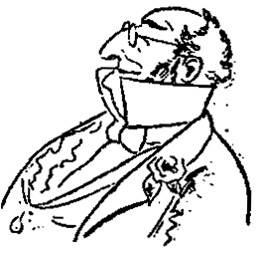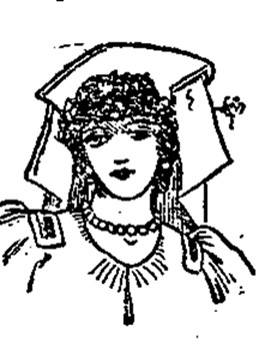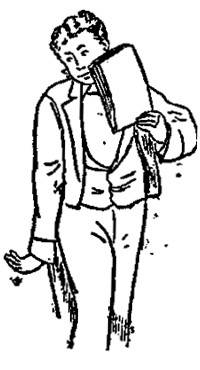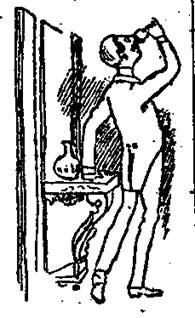This article has been transcribed from a copy of the Cardiff Timess in the online collection of scanned Welsh newspapers 1804-1919 in the National Library of Wales, with grateful recognition of the free access accorded to all readers. Where necessary paragraph breaks have been introduced for easier reading.
This is a lively debunking of the conventions of cheap drama and fiction. In it Samuel betrays attitudes which have long been ceased to be acceptable. This is one of numerous articles in which Samuel claims theatrical experience. ‘O my prophetic soul! Mine uncle?’ is from Hamlet (I.v.41), in which the uncle is the murderer, of course, while to have a ‘cod’ is mainly theatrical slang for to deceive or play a trick. The pun on ‘chisselled’ depends on the slang meaning of ‘cheated’, which survives into the twenty-first century. Sugar is slang for money. ‘Blood allies’ and ‘stoneys’ are varieties of marbles, the ‘stoney,’ being made of some hard stone, while an ‘alley’ is made of alabaster, and was reckoned the most valuable marble. Samuel ends by quoting the syrupy hymn ‘Sweet by and by’ (of 1868) by S. Fillmore Bennett with music by Joseph P. Webster: ‘In the sweet by and by / We shall meet on that beautiful shore.’

The nice, good little girl of the story books.
ERFECTLY convinced am I, sir, that this world is one of unadulterated humbug – it is world full of disillusionments and ideals that are never realised, and there are a most astonishing number of what I may call self-interested, professional humbugs, or ‘codders’ (as they are dubbed in the theatrical profession) all around and about us – l'm a bit of a humbug myself, and, ‘Oh, yes, I ought to know.’ Look at those awful frauds, the novelists and story tellers of this era – and any other era you like to name. Look at their character pictures – are they not all wilful and fearful lies? Look at their young lady – the young person with the ‘chiselled’ features (her features are not as much ‘chiselled’, I take it, as are the deluded people who believed in her), ‘alabaster brow,’ ‘commanding, yet graceful mien,’ &c,. &c., &c. The frauds who describe her quite omit to mention that she has a fiend of a temper, probably, that she eats a deuce of a lot in the pantry, and then at [at] dinner, whilst male admirers are present, absolutely takes next to nothing, want of appetite being ‘so interesting, you know.’ They don't tell you that she throws teacups at her sisters, that she reads the Weekly Ha'porth of Horrorsand the Family Figment of Falsehood when she ought to be baking or darning stockings. According to the veracious chroniclers I have named the lady in question is always a perfect musician: her ‘long, slender, graceful fingers,’ &c., ‘run lightly o'er (orthodox ab[b]reviation) the keys,’ whilst, in a voice of ‘exquisite sweetness,’ she harrows up the souls of ‘the rapt listeners.’ Quite so. I quite believe in the harrowing up part so far as the grim reality is concerned. Who that has heard the average real young woman of everyday life sing and play can contemplate the author's ideal without saying ‘bah, bah to you, pooh, pooh to you?’ It won't bear thinking of.

The kindly paterfamilias of the novelist and playwright! Ask him to lend you –a trifle and you’ll see!.
And where are the nice, benevolent old gentlemen? They generally are ‘Uncles’ (‘oh, my prophetic soul, my uncle’) who turn up so opportunely to relieve the pecuniary necessities of the hero and heroine. Ah, where, indeed? They are usually depicted as choleric old gentlemen, who, ‘beneath a brusque manner,’ conceal an over-weening kindliness of disposition. Bless us, they are always ready to advance thousands in a case of necessity – according to the novelist. But you just try to ‘rush’ the choleric uncle of reality for an odd ‘fiver,’ and you’ll find all the ‘choler,’ and the ‘cuff,’ too, for that matter, but none of the fiver; you’ll get the genteel, or the actual, ‘kick out,’ and you’ll find yourself on the doorstep, like the ‘fiver’ you intended to borrow all alone – I mean all a loan. I know the uncle of real life, I can tell you. A grumpy old humbug, who is always talking about his shekels and his ducats, and drawing irritating comparisons between your comparatively impecunious position and his own affluence, which latter is, of course, according to him, solely due to his own wondrous acumen and ability.

The little by of reality. ‘I do like jam.’
Then there is that horrid and most objectionable juvenile prig and coxcomb, the ‘Little Willie’ or ‘Little Jimmie’ (I could never believe in a boy being of the goody goody order who was called ‘Jimmie’) of the boys' story-tellers – or thumping lie-tellers, as I should call them. Little Willie fortunately always dies young, and in the moonlight, if possible, but some authors manage to make a good deal out of him whilst he is in this world of sorrow and wickedness. He has nice auburn curls; he never contradicts his ‘Ma’; he never steals jam, makes marbles redhot in order that other boys may pick them up, never runs pins into school-fellows, never puts cobblers' wax upon the seat of old gentlemen's chairs, and never tells taradiddles in order that companions may get a thrashing for his offences, and he always has a clean face, and says his prayers to his ‘Ma’ aforesaid, and wears a beautiful frilled collar which he never crumples or bedaubs with treacle, and he says such beautiful things about angels and so on, and, oh, my stars, he is an objectionable, unwholesome little imp. All the so-called bad little boys must hate him, because he is perpetually being held up as an example. I know what they would do with him if they met him in real life. They would cut his nice flaxen curls with blunt penknives; they would despoil him of his ‘blood allies’ and ‘stoneys;’ they would probably damage his nose; they would have a ‘cod’; they would call him ‘Nancy,’ and treat him with general and well-deserved contumely.

Have not met one like this with a organ-grinder yet.
Dear, dear, sir, what a lot of humbugging people I do read about and never see. There is the hero of the novelist and dramatis -- the good young man that never went wrong; the young man who is so disinterested in his affections that he will not propose to the girl who loves him because she has the ‘sugar’ and he hasn't, and he wishes to preserve his ‘noble independence’ of character. Have you met him in real life? You know what he'd do in this mundane sphere, don't you? (Pardon this knowing wink.) He'd soon waltz off the girl, eh? And he'd take care of her banking account; what do you think? He'd soon be at the ‘Spas’ with her, and his merry little dog-cart would rattle merrily past you, and he would find that business did not agree with his health, and that in these days of the glorious uncertainty of speculation, he was much better doing nothing at all.

‘Couldn’t think of taking anything, sir! It’s againt the rules of the establishment.
Oh, those novelists are a set of humbugs, Look at their fearless ‘Red Man’ and ‘La Belle Sauvage,’ the savage people that [a]re s[o] noble in their mien (very mean as for as their nobility goes, I should say), so true in their friendships, and so relentless and truculent in their hatred. And then we sink again to the stern platform of realism, and find ‘La Belle Sauvage’ a rum-drinking harridan, who washes herself in dirty train oil, blackens her teeth artificially, and probably wears a fish-bone stuck through her nose. And we find the noble savage warriors (whose staple stock of conversation seems, according to the reliable chronicler of his prowess, to be ‘Ugh’) a miserable and abject thief, a confirmed drunkard, and a disgrace to humanity all round – a man who never has had a bath, and never will until he is forced. It is just the same with the beauteous Italian girl we read about. I am not asking you to say what you have seen of her in her capacity of a musical murderess with a piano organ, and a dirty ruffian who wears earrings, or with one who sells ice-cream warranted to ruin the whole internal organisation of any juvenile who swallows it. In England this dusky child of Italy is more often than not an Italian from Cork or Tipperary with a rich brogue. But even in her own ‘sunny clime’ (good old, orthodox expression) she is a squalid creature, who is, as a general rule, an old woman when she is about twenty-five.

‘Niver tasted a drop of anything “short” in my life, I assure you.’
And where are some other people we read about? Where are the waiters who never take tips, and the young nobleman of vast wealth who ranges about areas honourably looking for beauty in a humble sphere, glutted as he is with the frivolous charms of those whose homes are in palaces? I have read of him often in The Family Horror (one penny weekly, of all newsagents), but I haven't dropped across him in the flesh yet. Where is the ‘sleuth- hound’ (excellent penny novellette word) detective, who for ‘yee-ahs’ ‘ter-acks’ the ‘villa-in,’ sets the other officers of the law, ‘ber-lud-hound’ like, in motion, and finally says to the villain aforesaid, ‘Villin, we meet-ar at larst; I am Snuggles, the detective!’ Where is the man who has never tasted a drop of intoxicating drink in his life? I have often read of him -- I have never yet seen him, though. I have, I must confess, met the man who said that he had never had a day's sickness or a headache in his life, and I bluntly told him, and – well, I told him that I didn't think that he was a strictly truthful person. Then have I not read of good white-haired old gentlemen who gave sovereigns to beggar children, of men who preferred the fustian of the lowly to the three-piled velvet of the aristocracy, or heroines who began to write novels and made a big fortune straight off, of ballet girls who supported an aged father (the ‘dying clown’ fake, you'll remember it) of – well, of scores of human monstrosities and anomalies that I have certainly never met in real life, and that I never expect to meet. Perhaps we may strike up an acquaintance on ‘that bew-tiful shore,’ as the song says — that is, of course, if ever I land in that happy region.
Last modified 8 February 2022